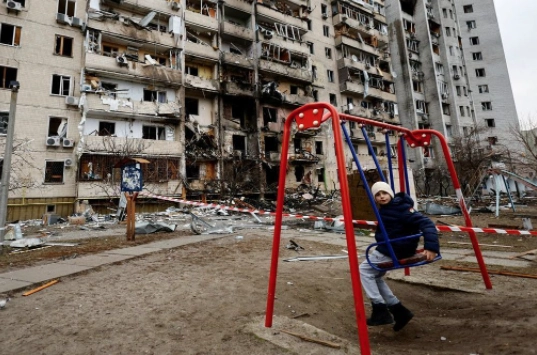The Financial Times reported that Moscow and Kiev are working on a fifteen-point agreement, which includes Ukraine’s neutrality and a limitation of its military forces and weaponry, in exchange for an immediate cease-fire and the withdrawal of Russian troops from Ukrainian territory.
If such an agreement were to be reached, it would mean the acceptance of the proposal on the same terms that some of us had made to avoid war before it broke out. It would fit the old adage that no saddlebags were needed for such a journey and that, rather, much destruction and death could have been avoided. But it was necessary to show that the West was capable of cornering the menacing bear on the basis of the muscular Atlantic deterrence. It’s a shame though, that Ukraine bought that fiction with enthusiasm, only to end up paying the bill for the stubborn reality.
Military observers point out that, in any case, the end of armed hostilities will not come for a month or two. In the meantime, it is foreseeable that the attacks will intensify. By the time the cease-fire stabilizes, both sides will make a clearly positive balance sheet in their favor. They will say that all military objectives were achieved. They may even exhibit significant partial victories. Russia could argue that it has stopped NATO’s advance towards its borders, or that it has consolidated its possession of Crimea and the expansion of territories in the Donbas; that it has managed to show its military capability in Kiev and Kharkov, among other things.
Meanwhile, Ukraine would show that most of the territory is still in its hands, or that it keeps some important capitals intact, such as Lviv, and it might even have managed to prevent Kiev from falling into Russia’s power.
In reality, if the military situation does not change much in the coming weeks, the most realistic balance will reflect that the outcome of the military confrontation has ended in a draw. Russia hasn’t achieved a quick victory as it had intended, including the capture of the Ukrainian government, and has had to change strategy several times, in light of the logistical requirements of a slower advance and unanticipated resistance from the Ukrainian armed forces and population.
For its part, Ukraine has begun to realize that the encirclement of the cities is subjecting its population to excessive suffering, which could be avoided if it stops the war, and that it will not succeed in hitting Russia hard enough to make it leave its territory. Its desperate plea to Western countries to close its airspace is made in the knowledge that Russia hasn’t yet used its strategic force, something that could change the course of the war, thereby multiplying the destruction of its cities.
It seems plausible that this war standoff will turn out to be the real balance that would take place when the war comes to an end, if the forecasts suggested by the Financial Times about a forthcoming agreement come true. Of course, taking into account the imbalance of forces between the two contenders, all the credit goes to Ukraine. To make a handy soccer simile, it is as if a third division team were to draw with a Champions-League champion.
However, this situation will change rapidly as soon as the post-war period begins. Russia will not be able to hide the fact that its “special operation” has not been as liberating as it intended—with the exception of the pro-Russian provinces in the east—but quite the contrary. The military punishment has provoked resentment in the Ukrainian population, which often translates into open hatred. The wounds produced will not heal easily and should strengthen the Ukrainian people’s sense of identity.
On the other hand, the reconstruction process in Ukraine will have massive support from Western governments. Perhaps much more than the Marshall Plan did for Europe after World War II. It is possible that this reconstruction will have a decisive effect on Ukraine itself. As it is known, the reluctance of the European Union to accept an express incorporation of Kiev into the EU has causes that refer to the visible weaknesses and irregularities in the Ukrainian institutions. It could happen that the massive support of the EU and the United States to the reconstruction would be conditioned to an internal modernization and to the elimination of the proverbial corruption that affects Ukrainian institutionality.
In short, as soon as Ukraine regains relative normalcy, the economic and political resurgence of that country is likely to be considerable. In the meantime, the Russian attacker will have to spend a long time licking his wounds, without ruling out that the implications of the war will have greater negative impacts on Moscow than Putin was even able to imagine.
Translated from Spanish by Ricardo Aceves











